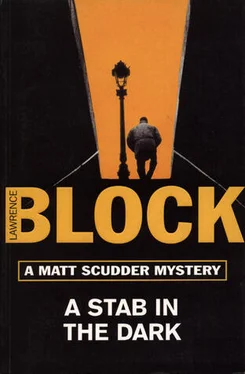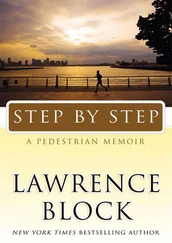Lawrence Block - A Stab in the Dark
Здесь есть возможность читать онлайн «Lawrence Block - A Stab in the Dark» весь текст электронной книги совершенно бесплатно (целиком полную версию без сокращений). В некоторых случаях можно слушать аудио, скачать через торрент в формате fb2 и присутствует краткое содержание. Год выпуска: 1997, ISBN: 1997, Издательство: Avon, Жанр: Детектив, на английском языке. Описание произведения, (предисловие) а так же отзывы посетителей доступны на портале библиотеки ЛибКат.
- Название:A Stab in the Dark
- Автор:
- Издательство:Avon
- Жанр:
- Год:1997
- ISBN:9781857997262
- Рейтинг книги:3 / 5. Голосов: 1
-
Избранное:Добавить в избранное
- Отзывы:
-
Ваша оценка:
- 60
- 1
- 2
- 3
- 4
- 5
A Stab in the Dark: краткое содержание, описание и аннотация
Предлагаем к чтению аннотацию, описание, краткое содержание или предисловие (зависит от того, что написал сам автор книги «A Stab in the Dark»). Если вы не нашли необходимую информацию о книге — напишите в комментариях, мы постараемся отыскать её.
A Stab in the Dark — читать онлайн бесплатно полную книгу (весь текст) целиком
Ниже представлен текст книги, разбитый по страницам. Система сохранения места последней прочитанной страницы, позволяет с удобством читать онлайн бесплатно книгу «A Stab in the Dark», без необходимости каждый раз заново искать на чём Вы остановились. Поставьте закладку, и сможете в любой момент перейти на страницу, на которой закончили чтение.
Интервал:
Закладка:
"That's a lot of cash to be carrying in this town."
"Maybe you'd like to carry it for me." She studied my face, and when I failed to react she leaned forward, dropping her voice conspiratorially. "The money's for you, Mr. Scudder. Just do what Mr. London already asked you to do. Drop the case."
"What are you afraid of, Mrs. Ettinger?"
"I just don't want you poking around in our lives."
"What is it you think I might find there?" Her hand clutched her purse, seeking security in the presumptive power of five thousand dollars. Her nail polish was the color of iron rust. Gently I said, "Do you think your husband killed his first wife?"
"No!"
"Then what have you got to be afraid of?"
"I don't know."
"When did you meet your husband, Mrs. Ettinger?"
She met my eyes, didn't answer.
"Before his wife was killed?" Her fingers kneaded her handbag. "He went to college on Long Island. You're younger than he is, but you could have known him then."
"That was before he even knew her," she said. "Long before they were married. Then we happened to run into each other again after her death."
"And you were afraid I'd find that out?"
"I—"
"You were seeing him before she died, weren't you?"
"You can't prove that."
"Why would I have to prove it? Why would I even want to prove it?"
She opened the purse. Her fingers clumsy with the clasp but she got the bag open and took out a manila bank envelope. "Five thousand dollars," she said.
"Put it away."
"Isn't it enough? It's a lot of money. Isn't five thousand dollars a lot of money for doing nothing?"
"It's too much. You didn't kill her, did you, Mrs. Ettinger?"
"Me?" She had trouble getting a grip on the question. "Me? Of course not."
"But you were glad when she died."
"That's horrible," she said. "Don't say that."
"You were having an affair with him. You wanted to marry him, and then she was killed. How could you help being glad?"
Her eyes were pitched over my shoulder, gazing off into the distance. Her voice was as remote as her gaze. She said, "I didn't know she was pregnant. He said … he said he hadn't known that either. He told me they weren't sleeping together. Having sex, I mean. Of course they slept together, they shared a bed, but he said they weren't having sex. I believed him."
The waitress was approaching to refill our coffee cups. I held up a hand to ward off the interruption. Karen Ettinger said, "He said she was carrying another man's child. Because it couldn't have been his baby."
"Is that what you told Charles London?"
"I never spoke to Mr. London."
"Your husband did, though, didn't he? Is that what he told him? Is that what London was afraid would come out if I stayed on the case?"
Her voice was detached, remote. "He said she was pregnant by another man. A black man. He said the baby would have been black."
"That's what he told London."
"Yes."
"Had he ever told you that?"
"No. I think it was just something he made up to influence Mr. London." She looked at me, and her eyes showed me a little of the person hidden beneath the careful suburban exterior. "Just like the rest of it was something he made up for my sake. It was probably his baby."
"You don't think she was having an affair?"
"Maybe. Maybe she was. But she must have been sleeping with him, too. Or else she would have been careful not to get pregnant. Women aren't stupid." She blinked her eyes several times. "Except about some things. Men always tell their girlfriends that they've stopped sleeping with their wives. And it's always a lie."
"Do you think that—"
She rolled right over my question. "He's probably telling her that he's not sleeping with me anymore," she said, her tone very matter-of-fact. "And it's a lie."
"Telling whom?"
"Whoever he's having an affair with."
"Your husband is currently having an affair with someone?"
"Yes," she said, and frowned. "I didn't know that until just now. I knew it, but I didn't know that I knew it. I wish you had never taken this case. I wish Mr. London had never heard of you in the first place."
"Mrs. Ettinger—"
She was standing now, her purse gripped in both hands, her face showing her pain. "I had a good marriage," she insisted. "And what have I got now? Will you tell me that? What have I got now?"
Chapter 15
I don't suppose she wanted an answer. I certainly didn't have one for her, and she didn't hang around to find out what else I might have to say. She walked stiffly out of the coffee shop. I stayed long enough to finish my own coffee, then left a tip and paid the check. Not only hadn't I taken her five thousand dollars, but I'd wound up buying her coffee.
It was a nice day out and I thought I'd kill a little time by walking part of the way to my appointment with Lynn London. As it turned out I walked all the way downtown and east, stopping once to sit on a park bench and another time for coffee and a roll. When I crossed Fourteenth Street I ducked into Dan Lynch's and had the first drink of the day. I'd thought earlier that I might switch to Scotch, which had once again spared me a hangover, but I'd ordered a shot of bourbon with a short beer for a chaser before I remembered my decision. I drank it down and enjoyed the warmth of it. The saloon had a rich beery smell and I enjoyed that, too, and would have liked to linger a while. But I'd already stood up the schoolteacher once.
I found the school, walked in. No one questioned my entering it or stopped me in the corridors. I located Room 41 and stood in the doorway for a moment, studying the woman seated at the blond oak desk. She was reading a book and unaware of my presence. I knocked on the open door and she looked up at me.
"I'm Matthew Scudder," I said.
"And I'm Lynn London. Come in. Close the door."
She stood up and we shook hands. There was no place for me to sit, just child-sized desks. The children's artwork and test papers, some marked with gold or silver stars, were tacked on bulletin boards. There was a problem in long division worked out in yellow chalk on the blackboard. I found myself checking the arithmetic.
"You wanted a picture," Lynn London was saying. "I'm afraid I'm not much on family memorabilia. This was the best I could do. This was Barbara in college."
I studied the photo, glanced from it to the woman standing beside me. She caught the eye movement. "If you're looking for a resemblance," she said, "don't waste your time. She looked like our mother."
Lynn favored her father. She had the same chilly blue eyes. Like him she wore glasses, but hers had heavy rims and rectangular lenses. Her brown hair was pulled back and coiled in a tight bun on the back of her head. There was a severity in her face, a sharpness to her features, and although I knew she was only thirty-three she looked several years older. There were lines at the corners of her eyes, deeper ones at the corners of her mouth.
I couldn't get much from Barbara's picture. I'd seen police photos of her after death, high-contrast black and whites shot in the kitchen on Wyckoff Street, but I wanted something that would give me a sense of the person and Lynn's photograph didn't supply that, either. I may have been looking for more than a photograph could furnish.
She said, "My father's afraid you'll drag Barbara's name through the mud. Will you?"
"I hadn't planned on it."
"Douglas Ettinger told him something and he's afraid you'll tell it to the world. I wish I knew what it was."
"He told your father that your sister was carrying a black man's child."
"Holy Jesus. Is that true?"
"What do you think?"
"I think Doug's a worm. I've always thought that. Now I know why my father hates you."
Читать дальшеИнтервал:
Закладка:
Похожие книги на «A Stab in the Dark»
Представляем Вашему вниманию похожие книги на «A Stab in the Dark» списком для выбора. Мы отобрали схожую по названию и смыслу литературу в надежде предоставить читателям больше вариантов отыскать новые, интересные, ещё непрочитанные произведения.
Обсуждение, отзывы о книге «A Stab in the Dark» и просто собственные мнения читателей. Оставьте ваши комментарии, напишите, что Вы думаете о произведении, его смысле или главных героях. Укажите что конкретно понравилось, а что нет, и почему Вы так считаете.












